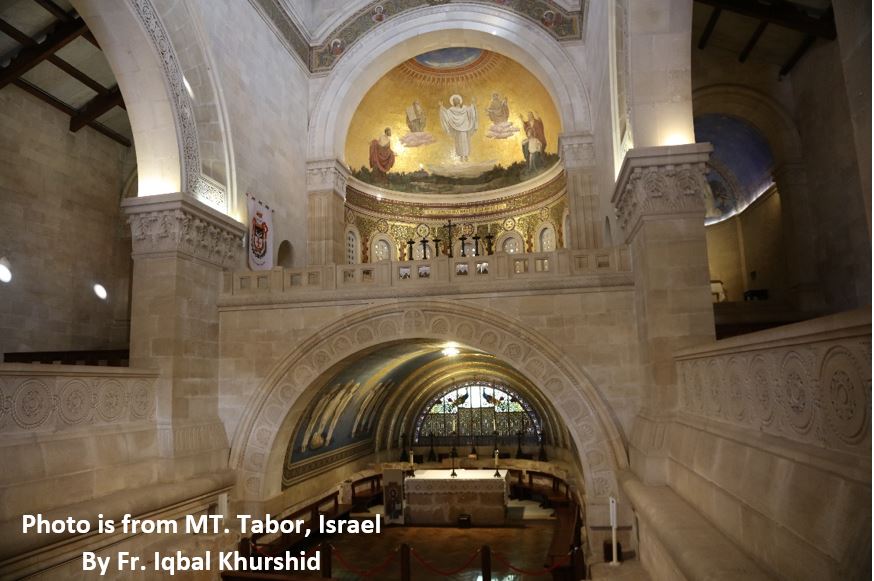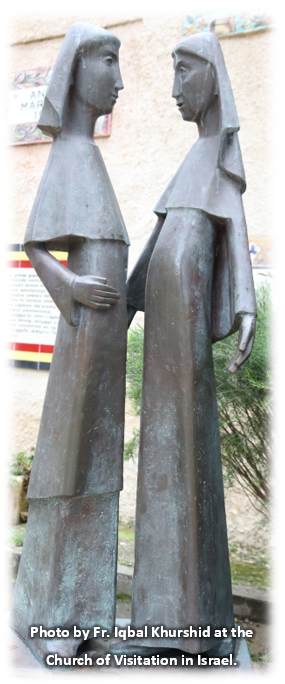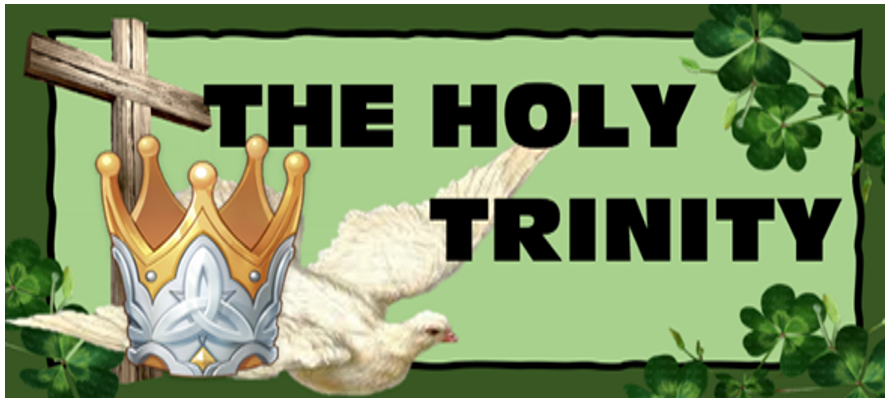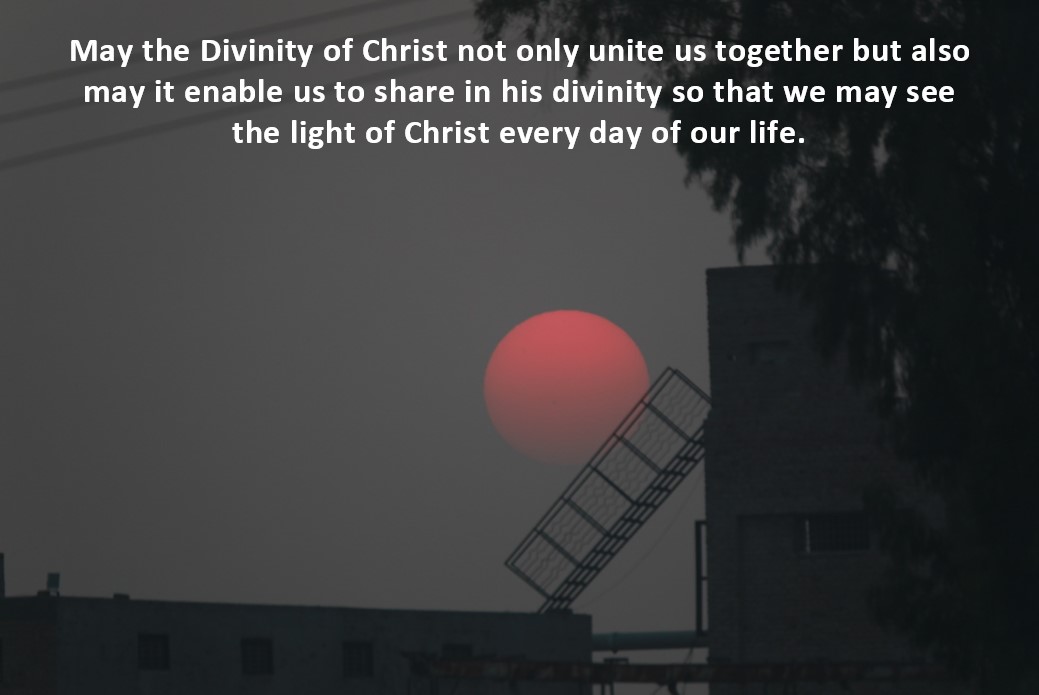
2nd Sunday of Lent – Year C – March 13, 2022
BEING WITH THE LORD
We continue our Lenten journey with prayer, fasting and alms giving. This is a beautiful time of grace and to believe that Jesus Christ our Lord suffered and died for us as St. Paul said in the Second Reading of last Sunday “This is acceptable time, this is time of Salvation”. Last Sunday we reflected on the Temptations of Jesus and were strengthened by the Lord to learn how to overcome and be strong. St. Cyprian, Martyr, once gave very beautiful reflection to remind us how to be strong in our faith: “Dear brothers, the commands of the Gospel are nothing else than God’s lessons, the foundations on which to build up hope, the supports for strengthening faith, the food that nourishes the heart. They are the rudder for keeping us on the right course, the protection that keeps our salvation secure. As they instruct the receptive minds of believers on earth, they lead safely to the kingdom of heaven.
God willed that many things should be said by the prophets, his servants, and listened to by his people. How much greater are the things spoken by the Son. These are now witnessed to by the very word of God who spoke through the prophets. The Word of God does not now command us to prepare the way for his coming: he comes in person and opens up the way for us and directs us toward it. Before, we wandered in the darkness of death, aimlessly and blindly. Now we are enlightened by the light of grace, and are to keep to the highway of life, with the Lord to precede and direct us. Let the Father recognize the words of his Son. Let the Son who lives in our hearts be also on our lips. We have him as an advocate for sinners before the Father; when we ask for forgiveness for our sins, let us use the words given by our advocate. He tells us: Whatever you ask the Father in my name, he will give you. What more effective prayer could we then make in the name of Christ than in the words of his own prayer?”
An old man was living in a temple and the demons came to say to him, “Leave this place which belongs to us,” and the old man said, “No place belongs to you.” Then they began to scatter his palm leaves about, one by one, and the old man went on gathering them together with perseverance. A little later the devil took his hand and pulled him to the door. When the old man reached the door, he seized the lintel with the other hand crying out, “Jesus, save me.” Immediately the devil fled away. Then the old man began to weep. Then the Lord said to him, “Why are you weeping?” and the old man said, “Because, the devils have dared to seize a man and treat him like this.’ The Lord said to him, “You had been careless. As soon as you turned to me again, you see I was beside you.” I say this, because it is necessary to take great pains, and anyone who does not do so, cannot come to his God. For He himself was crucified for our sake. That is the great gift of being with the Lord that we are able to feel and listen to him.
In the First Reading Abraham is experiencing something extraordinary. He was called from Ur to the unknown place to live and he without questioning anything he obeyed the Lord. Today he is having dialogue with God and is opening his heart to God who called him to an unknown place to dwell. The chapter 15 of the Book of Genesis brings us to three very important elements:
- A Promise Given (Genesis 15:1-3)
- A Promise Believed (Genesis 15:4-6)
- A Promise Guaranteed (Genesis 15:7-21)
God now comes to Abram in Genesis 15:1 and says, “After these things the word of the Lord came to Abram in a vision, “Do not be afraid, Abram, I am your shield; your reward shall be very great.” Here was a good reason for God to say this. Abram had just defeated a much larger army made up of a partnership of four kings. He had reason to be afraid, expecting an attack of retribution. God told Abram that though he had sacrificed for His sake, he would not be the loser for it. God would more than make up what Abram gave unto the LORD. God promise a blessing which for him was not possible because he and his wife both for old. But God knew his need as he knows how to become the answer to our need. When we need a shield or a reward, He becomes those things for us. “I do not think that any human mind can ever grasp the fullness of meaning of these four words, ‘I am thy reward.’ God himself the reward of his faithful people”.
Abram believed in the promise of God that he is going to be blessed with a son and his descendants are going to be like the stars in the sky and sand on the shore. Beyond even this, God promises Abram in chapter 12 that all the people of earth would be blessed through him. This can only be one thing – the Messiah would come through Abram. Maybe here in chapter 15 when Abram asks for a son, he is asking for the Messiah. We don’t know that, but it is a possibility. So far, we do not have anything firm. But when we take Romans 4 and Galatians 3 where Paul says that this is when he believed, we can be certain that this is when he believed, rather than some earlier time. But the real key to understanding what exactly Abram believed in John 8:56 where Jesus says, “Abraham rejoiced to see My day, and he saw it and was glad.”, “Two thousand years before Jesus came, Abraham looked ahead in time and believed in the coming Christ for eternal life. Therefore, he was saved by faith alone in Christ alone.”
What did Abram believe? Yes, he believed God’s Word, but what specific truth from God did he believe? He believed in the coming Messiah, the Messiah that would come through him, for eternal life. It is at this point that God credited him with righteousness. Abram had lots of good works before he believed, and he will have more after. When we believe in God’s Word, specifically when we believe what it says about Jesus, that God gives eternal life to everyone who believes in Jesus for it, like Abram, we are declared righteousness by God. There is no other way to receive eternal life. Abram believed the promise, and so was justified. Of all the ways that God gives Himself to us, this is the greatest. Through our faith, His nature is given to us. Do we believe in the promises of God to be with him? Remember no matter what happens in life, if we have Jesus, if we have God as our reward, we have everything – and more – than we need.
Lastly after God promised Abram with the gift of a son and Abram believed in his promise then God guaranteed that what he has promised is 100% real and there going to be no way that he is going to be turned away. He was called friend of God because of his faith and belief. Do we struggle to be his friends?
Here is a story from the desert fathers for us to understand the Second Reading today as St. Paul not only invites Philippians to imitate him in following the Lord but also warns against the enemies of the Cross of Christ. Are we not living among those people who refuses to believe in Jesus and utter all kinds of things against him? (Please remember, names mentioned in the story are all saints and they are called desert fathers, for example St. Sisois the Great)
A brother named Pystus told this story: Seven of us hermits went to Sisois, who was living in the island of Clysmatus. When we asked him to give us a word, he answered, ‘I’m afraid I’m very ignorant. But I once went to see Hor and Athrem when Hor had been ill for eighteen years. I began to beg them to speak a word to me. Hor said, “What can I say to you? Go and do whatever you think right. God is the God of the man who extracts from himself more than he can do, and carries all by violence.” These men, Hor and Athrem, were not from the same province. But there was much love between them until their death. Athrem was a man of perfect obedience, Hor of great humility. I spent a few days with them, observing their virtues; and I saw Athrem do a wonderful thing. Someone brought them a little fish, and Athrem wanted to prepare it for his brother, Hor. So Athrem took a knife and cut into the fish: but at that moment Hor called him, “Athrem, Athrem.” He left the knife in the middle of the fish and did not finish the cut but ran to Hor. I was astonished at his obedience, and that he did not say, “Wait until I have cut up this fish.” So I said to Athrem, “Where did you learn such obedience?” He answered me, “It is not mine: it is his.” He said, “Come and see his obedience.” He intentionally cooked some fish badly and put a piece in front of Hor; he ate it without saying a word. Athrem said, “Was it good, abba?” He answered, “Very good.” Then he brought him another piece, very well cooked, and said, “Look here, I have ruined it, abba, by cooking it badly.” Hor answered, “Yes, you have cooked it rather badly.” Athrem turned to me and said, “Did you see his obedience?” I left them and ever since I have tried, as far as I could, to practise what I saw.’ All this was told the brothers by Sisois. One of us asked him, ‘Please, speak a word to us.’ He said, ‘Whoever has limitless knowledge understands the Scriptures perfectly.’ Another of us asked him, ‘What is pilgrimage, abba?’ He answered, ‘To keep silent: and wherever you go say, “I am at peace with all men”: that is pilgrimage.’
I believe season of Lent is season of humility and comes from being with the Lord as St. Paul says “But our citizenship is in heaven, and it is from there that we are expecting a Saviour, the Lord Jesus Christ. He will transform the body of our humiliation that it may be conformed to the body of his glory, by the power that also enables him to make all things subject to himself”. Being with the Lord means to “stand firm in the Lord” and enjoy his glory as did apostles do in the Gospel today.
On this Second Sunday of Lent, the liturgy leads us to contemplate the event of the Transfiguration in which Jesus allows the disciples Peter, James and John a foretaste of the glory of the Resurrection: a glimpse of heaven on earth. Luke the Evangelist reveals to us Jesus transfigured on the mountain, which is the place of light, a fascinating symbol of the unique experience reserved to the three disciples. They go up the mountain with the Master, they see him immersed in prayer and, at a certain point, “the appearance of his countenance was altered”. Accustomed to seeing him daily in the simple appearance of his humanity, they are astonished as they face that new splendour that also envelops his entire body. And Moses and Elijah appear beside Jesus and speak with Him about his forthcoming “exodus”, that is, of his Paschal death and Resurrection. It is a preview of Easter. Then Peter exclaims: “Master, it is well that we are here”. He wished that that moment of grace would never end! St. Peter cherished this memory as he mentions in his letter; “For we did not follow cleverly devised myths when we made known to you the power and coming of our Lord Jesus Christ, but we had been eyewitnesses of his majesty. For he received honor and glory from God the Father when that voice was conveyed to him by the Majestic Glory, saying, “This is my Son, my Beloved, with whom I am well pleased.” We ourselves heard this voice come from heaven, while we were with him on the holy mountain. So, we have the prophetic message more fully confirmed. You will do well to be attentive to this as to a lamp shining in a dark place, until the day dawns and the morning star rises in your hearts. First you must understand this, that no prophecy of scripture is a matter of one’s own interpretation, because no prophecy ever came by human will, but men and women moved by the Holy Spirit spoke from God” (2 Peter 1:16-21). How amazing experience, they had by being with the Lord? Lord gives us the chance everyday through the Holy Eucharist to be with him and experience his glory.
The Transfiguration occurs at a precise moment in Christ’s mission, that is, after he has confided to his disciples that he would have to “suffer many things, be killed, and on the third day be raised”. Jesus knows that they do not accept this reality — the reality of the Cross, the reality of Jesus’ death —, and so he wants to prepare them to withstand the scandal of the passion and death on the Cross, so that they may know that this is the way through which the heavenly Father will lead his Son to glory; by raising him from the dead. And this will also be the way for the disciples: no one can reach eternal life if not by following Jesus, carrying their own cross in their earthly life. Each of us has his or her own cross. The Lord reveals to us the end of this journey, which is the Resurrection, beauty: by carrying one’s own cross.
Therefore, the Transfiguration of Christ shows us the Christian perspective of suffering which is a necessary but transitory passage. The point of arrival to which we are called is luminous like the face of Christ Transfigured: in him is salvation, beatitude, light and the boundless love of God. By revealing his glory in this way, Jesus ensures that the cross, the trials, the difficulties with which we struggle, are resolved and overcome in Easter. Thus, this Lent, let us also go up the mountain with Jesus! But in what way? With prayer. Let us climb the mountain with prayer: silent prayer, heartfelt prayer, prayer that always seeks the Lord. Let us pause for some time in reflection, a little each day, let us fix our inner gaze on his countenance and let us allow his light to permeate us and shine in our life. Be amazed with the words of St. Peter “Lord it is good to be here” and continue to be with the Lord who transforms our lives to be pleasing to him.
Let us joyfully continue our Lenten journey. Let us make room for prayer and for the Word of God which the liturgy abundantly offers us these days. Let us read the story of Zacchaeus and see how Lord’s presence is changing our lives as we are trying to be with him?
“He entered Jericho and was passing through it. A man was there named Zacchaeus; he was a chief tax collector and was rich. He was trying to see who Jesus was, but on account of the crowd he could not, because he was short in stature. So he ran ahead and climbed a sycamore tree to see him, because he was going to pass that way. When Jesus came to the place, he looked up and said to him, “Zacchaeus, hurry and come down; for I must stay at your house today.” So, he hurried down and was happy to welcome him. All who saw it began to grumble and said, “He has gone to be the guest of one who is a sinner.” Zacchaeus stood there and said to the Lord, “Look, half of my possessions, Lord, I will give to the poor; and if I have defrauded anyone of anything, I will pay back four times as much.” Then Jesus said to him, “Today salvation has come to this house, because he too is a son of Abraham. For the Son of Man came to seek out and to save the lost” (Luke 19:1-10)
Other Sermons In This Series

BRINGING JESUS TO OTHER | December 19, 2021 – 4th Sunday of Advent
December 17, 2021

Solemnity of Holy Trinity Year C ~ June 12, 2022
June 10, 2022

3rd Sunday in Ordinary Time Year A ~ January 22, 2023
January 20, 2023

